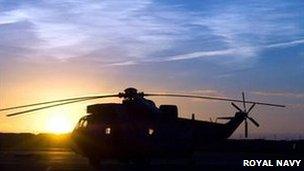Navy helicopter pilots simulate Afghan dust in Cornwall
- Published

Pilots using the simulator can practise flying in dusty conditions
Helicopter crews at a Cornish air base have started using new simulator technology to train for flying in Afghanistan.
The Sea-King simulator at RNAS Culdrose, near Helston, has been upgraded to replicate the effect of flying in a dusty environment.
It has also been installed with a database of different Afghan terrains.
Personnel from the base's two squadrons are currently spending up to six months a year in Afghanistan.
Commander Pat Douglas, Sea King Force Commander at Culdrose, said: "It's as good as it gets as far as simulators go.
"The picture is so good and lifelike that in a few seconds the pilot forgets they're not in the real aircraft."
The simulator is being used for training for up to 12 hours a day, five days a week.
'Absolute confidence'
As well as giving pilots experience of flying through dust, it can also now simulate the effect of flying with night vision goggles on.
Lieutenant John Wade, a pilot on 854 squadron, said: "You could go out to Afghanistan without simulator experience but you wouldn't feel as prepared and as confident.
"In a simulator you can do it with absolute confidence that nothing is going to happen to you."
The simulator, which has been in use since 1987, is also used to train pilots in search and rescue techniques.
Prince William did some of his training at RNAS Culdrose before being posted to RAF Valley on Anglesey.
The MOD said in November that "all options were being examined" regarding the possible part privatisation of the search and rescue operation at RNAS Culdrose.
The Sea King helicopters may be replaced by private helicopters by 2016.
- Published2 November 2010
- Published31 October 2010